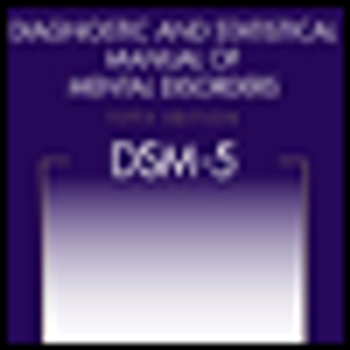
Both the DSM-5 Web site and Psychiatry News have recently heralded the proposed DSM-5 revision for diagnosis of personality disorders.


Both the DSM-5 Web site and Psychiatry News have recently heralded the proposed DSM-5 revision for diagnosis of personality disorders.

Psychiatrists may be more reluctant than are other mental health clinicians to sign a petition questioning the safety and value of DSM-5. After all, it is the American Psychiatric Association that is sponsoring DSM-5 and there is a natural tendency to want to trust the wisdom of one’s own Association.

The DSM-5 petition is now 12 days old and has already been signed by nearly 3500 people. It can be accessed at http://www.ipetitions.com/petition/dsm5/

After all this controversy and opposition, there is one thing (and one thing only) that will save the credibility of DSM-5 and guarantee its safety--a credible process of external scientific review.

So far, opposition to DSM-5 has been expressed by at least 11 organizations.

The petition to reform DSM-5 continues to gain momentum. In its first full week, more than 2300 people have already expressed their disapproval of the DSM-5 proposals and their desire to see dramatic changes. And the numbers are growing each day.

Just a few days ago, 3 divisions of the American Psychological Association posted a well crafted open letter spelling out the many risks posed by DSM-5 and inviting mental health professionals to sign a petition requesting much needed changes. You can see the letter and (if you agree with it) sign the petition at http://www.ipetitions.com/petition/dsm5/

Several divisions of the American Psychological Association have just written an open letter highly critical of DSM-5.They are inviting mental health professionals and mental health organizations to sign a petition addressed to the DSM-5 Task Force of the American Psychiatric Association. You can read the letter and sign up at http://www.ipetitions.com/petition/dsm5/. It is an extremely detailed, thoughtful, and well written statement that deserves your attention and support.

The mental health professions are currently awaiting the American Psychiatric Association’s newest version of the Diagnostic and Statistical Manual. The need for a fifth revision underscores the lack of satisfaction within the professions with our diagnostic schema

A recent front page story by Shari Roan in the Los Angeles Times explores the heated controversy over the DSM-5 proposal to include a Disruptive Mood Dysregulation Disorder (DMDD) in DSM-5. I very much oppose the inclusion of this new "disorder."

Below is an editorial (with the above title) taken from the newsletter of the Society of Biological Psychiatry and written by its editor Stephen M. Strakowski MD.

In preparing DSM-IV, we worked hard to avoid causing confusion in forensic settings. Realizing that lawyers read documents in their own special way, we had a panel of forensic psychiatrists go over every word to reduce the risks that DSM IV could be misused in the courts.

The DSM-5 attempt to “dimensionalize” the diagnosis of personality disorder has worthy goals, but has suffered from grievously incompetent implementation.

I recently experienced the odd coincidence of receiving 2 separate emails on the same morning each asking almost the very same question. . . how can I remain so high on psychiatry while at the same time being so critical of some of its recent trends and so fearful of the likely future harmful impact of DSM-5?

A newly appointed DSM-5 scientific review group is meant to “review the reviews”-but it is working in secret and so far appears to be a remarkably porous filter . . .DSM-5 has shown no capacity to self-monitor and self-correct. An outside review is sorely needed-and fortunately a ready mechanism is in place.

I just read a blog by Dr Dayle Jones that could have an important influence in the endgame effort to save DSM-5 from itself.

Psychiatric symptoms are fairly ubiquitous in the general population- most normal people have at least one, many have a few. When present in isolation, a single symptom (or even a few) does not a psychiatric disorder make. Two additional conditions must also be met before a symptom can be considered to be part of a mental disorder.

Psychosis Risk (AKA attenuated psychotic symptoms disorder) has always had 3 strikes against it.

Regretfully, if we are to judge the progress of DSM-5 by the incoherence of a recent commentary by the Chair and Vice-chair of the DSM-5 Task Force, we have a lot to worry about.

Bob Spitzer was prophetic 4 years ago when he warned that the closed DSM-5 process would lead to a flawed DSM-5 product. He advised the DSM-5 leadership to end its secrecy-- that a lack of openness would inevitably would lead to bad decisions not amenable to self-correction.

I never would have entered the DSM-5 controversy were it not for two of its proposals that risk furthering the already frightening overuse of antipsychotic medication, particularly in children and teenagers.

Martin Whiteley is an MP who represents Perth in the Australian parliament. He has been actively involved in mental health issues and succeeded in a crusade to curb what had been Perth's alarming overdiagnosis and overmedication of Attention Deficit Disorder (ADD).

The British Psychological Society is a highly esteemed organization representing 50,000 members. Recently, it released an open letter to the American Psychiatric Association offering a harshly critical view of DSM-5.

The DSM-5 Scientific Review Group was the last hope for an eleventh hour DSM-5 save. This hope recently died.

DSM-II was published in 1968. DSM-5 will be published in 2013. How much progress have we made? I propose that we approach this question with a quiz.